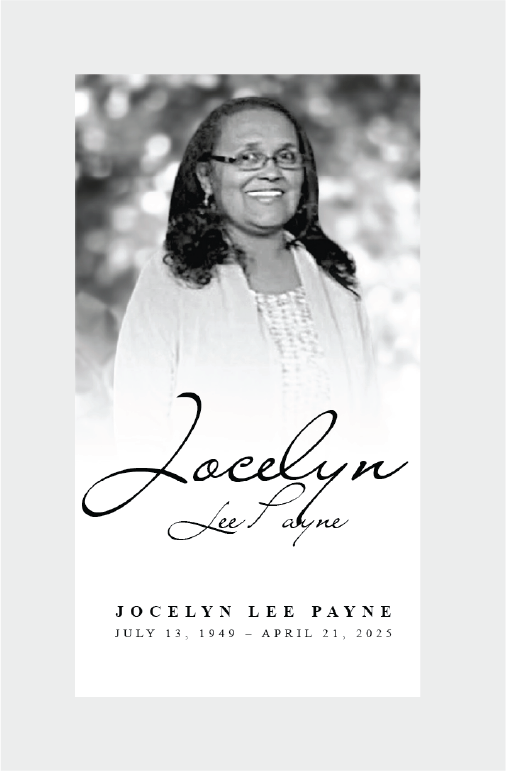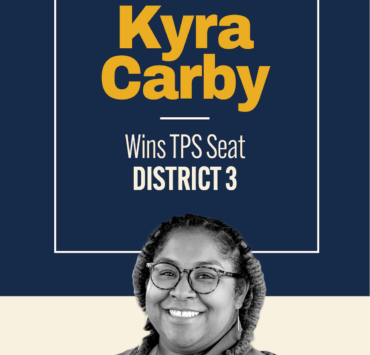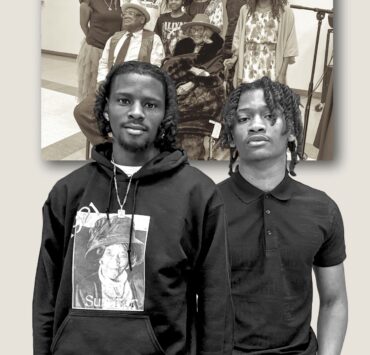
OBITUARY
Gary Lee
Jocelyn Lee Payne Source, Provided
Dr. Jocelyn Lee Payne was an inspiring and impactful scholar and leader in higher education in Oklahoma, a fierce advocate for social and racial justice and a caring mentor to several generations of Oklahomans, particularly women. Jocelyn embodied the principles of Black Excellence long before the term became popular and inspired anyone who came into her orbit to reach for the stars in whatever field they chose.
After facing with courage and grace the challenges resulting from a 2020 diagnosis of Parkinson’s, Jocelyn passed away on April 21, surrounded by the love of her family and friends.
In the early 1990s, Jocelyn was named vice president of student affairs at Northeastern State University in Tahlequah, Okla. That promotion made her one of the first Black women to serve in a senior role in a major institution of higher education in Oklahoma. In 2014, Jocelyn was appointed the first full-time executive director of The John Hope Franklin Center for Racial Conciliation in Tulsa. She used the role to encourage Tulsans of all races to bridge the gaps that have divided them for decades.
Jocelyn, an only child, was also tirelessly devoted to her parents, Johnson and Effie Jewell Lee. She was an engaging ally to a close-knit group of peers, and lifelong friends. She was a caring family member to a motley group of aunts and uncles, cousins, nieces and nephews in Oklahoma, Texas and elsewhere. She was also a doting godmother to her two godchildren.
Jocelyn’s faith was a key pillar of her life. In her early years, she and her family were members of St. Thomas Episcopal Church, a small, historically Black place of worship on North Peoria Street in Tulsa. In the late 1960s, when the church merged with St. Mark’s Episcopal Church, a mostly white institution, to become St. Aidan’s Episcopal Church, she enthusiastically joined the new, blended church family.
Jocelyn, who grew up in Jim Crowe era Tulsa, maneuvered past the confines that segregation imposed.
Jocelyn Lee was born July 13, 1949, to Johnson and Effie Jewell Lee, educators who were stalwart members of the north Tulsa community. Jocelyn was their only child and the couple at once provided an idyllic life for her and encouraged her to embrace books and learning. With their support, coupled with the nurturing of a village of mentors, and her keen interest in learning, Jocelyn was always at or near the top of her class.
From her primary school years as a pupil at Ralph Bunche Elementary School in north Tulsa, Jocelyn displayed a gift for reading and writing. As a 12-year-old seventh grader at Marian Anderson Junior High School, she became the first Black winner in the 25-year history of the Oklahoma Spelling Bee Championship and participated in the national spelling bee championship in Washington, D.C.
It was at Anderson that Jocelyn and seven of her friends formed the Great Eight, a group of classmates who pledged that they would excel in every school subject they undertook despite the stigmas of Tulsa’s segregated school system. Members of the original group were Sharman Stevenson, Mildred Wright, DeLois Dyer, Jocelyn Lee, Yla Eason, Ava Bell, Mary Dickson, and Debra Mitchell. Later Patricia Brown and Angela Busby joined, making the group The Great Eight Plus Two. Giving one another camaraderie, encouragement, and inspiration, the group has stayed together over decades. The group lost some members but held strong as a second family to Jocelyn and the others.
From Anderson, Jocelyn studied at Booker T. Washington High School. In particular, she excelled in literature classes and graduated in the BTW Class of 1967.
In 1967, Jocelyn entered the University of Oklahoma as a freshman and became an honors student. In 1969, she transferred to Brandeis University in Waltham, Mass., one of the top-ranked New England universities and graduated in 1971 with a Bachelor of Arts in Psychology.
In 1979, Jocelyn married George Payne. The marriage ended years later in divorce.
In 1982, Jocelyn joined the Alpha Kappa Alpha Sorority, Incorporated, the first top sorority in the U.S. for Black women. As an AKA member, she engaged in mentoring, the camaraderie of her peers, and support for education and the arts.
In the early 1980s, she became director of financial aid at Northeastern State University in Tahlequah. That move set Jocelyn on a tour of leadership at NSU that spanned two decades and included positions as an administrator, professor and highlighted by her tenure as vice president. Her former students and colleagues recall Joceyln’s book-lined office on the NSU campus as a haven of support and nurturing where Jocelyn guided them through the sometimes tough educational journeys and into careers.
As Jocelyn’s career advanced, she continued to pursue her own education. She received a Master of Science in College Teaching – Student Services from Northeastern State University and a Doctorate in Higher Education/Higher Education Administration from Oklahoma State University.
In the early 2000s, Jocelyn moved into her family home in north Tulsa to help care for her father, and later, her mother.
In 2014, Jocelyn became head of the John Hope Franklin Center for Reconciliation, an institution formed to strengthen the racial fracturing in Tulsa that resulted from the 1921 Tulsa Race Massacre. She used the position to push Tulsans to understand that racial healing could only be achieved through facing often difficult truths. Jocelyn organized semi-annual dinners at the center that featured Pulitzer Prize winning author Isabelle Wilkerson and other nationally known figures.
The position also lifted Jocelyn’s presence as an advocate for social justice, particularly for people of color in Tulsa and across Oklahoma. In 2014, the Tulsa World named her one of the Top Ten Tulsans To Watch.
Jocelyn left her position at JHF Center in 2016 and joined the boards of the Phillips Theological Center, The Center for Living Arts, and The Dan Allen Center for Social Justice.
Throughout her life, Jocelyn followed her twin passions for reading and culinary explorations. She liked few things better than a great book and often shared her favorite works with others and engaged in lively discussion about them.
Jocelyn’s father nurtured in her a love of food. During her adolescent years, the two collaborated in the kitchen, often inspired by recipes from Good Housekeeping magazine. Later, Jocelyn enjoyed dining out around Tulsa.
Jocelyn was a caring family member to a close-knit group of aunts, uncles, cousins, nieces, and nephews in Oklahoma, Texas, and beyond. She was also a devoted friend and an engaging presence among her peers.
Among the many who supported Jocelyn, Myrtle “Tiny” Baker and Alisa Bell held a particularly special place in her life. Their close friendship was characterized by unwavering support and deep compassion, which provided invaluable comfort to Jocelyn and her family throughout her health challenges.
She was predeceased by her beloved parents, Johnson and Effie Jewell Lee. She will be remembered fondly by her aunt Elreatha Lee, many cousins, godchildren, and a circle of devoted friends.
The funeral services for Jocelyn Lee Payne are scheduled for April 28, 11 a.m., at St. Aidan’s Episcopal Church, 4045 N. Cincinnati Drive , Tulsa, Okla.
In Joceyln Lee Payne’s memory, contributions may be made to J.A.M.E.S. Inc., a Tulsa nonprofit dedicated to expecting or parent adolescents or to a charitable Parkinson’s Foundation.









